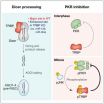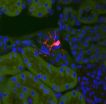(Press-News.org) December 2, 2014 - Now you don't even have live in Estonia to open a business there. A new program lets people purchase e-signatures that enable them to open bank accounts and run a domestic business without being physically present. But according to new research, people may not have the same trust in such businesses as they would others. A new paper finds that people are much more likely to discount the validity of an e-signature than a hand-signed document.
"Although e-signatures provide greater efficiency and convenience, they just seem a bit inauthentic," says Eileen Chou of the University of Virginia. "The document just feels different to me when it contains a hand signature," she says, which is why she has always signed her documents - whether mortgage applications or recommendation letters - by hand.
In today's world, where e-signatures are rapidly gaining popularity, Chou wanted to see how others responded to the practice. Across four studies, published today in Social Psychological and Personality Science, she found that although people judged e-signatures to be functionally the same as hand signatures, they evoked strikingly different psychological reactions.
In one study, Chou randomly assigned participants to review a document that either was signed by hand or electronically. They then evaluated the document's validity and indicated how strongly they perceived the signer's presence as they examined the document. Importantly, she did not ask participants to pay special attention to how the documents were signed, and she controlled for people's comfort level with technology.
"Yet, their overall reactions consistently demonstrated negativity toward documents containing e-signatures," Chou says. "This shows our deeply rooted rejection of the technology as being equal to sentient beings."
In another study, participants viewed documents with five different types of signatures - ranging from a checked box to a typed name to a computer-generated signature - and evaluated the signer's presence and the likelihood that the contract would be breached. The results show that the signatures demonstrating the least personal characteristics evoked the smallest sense of the signer's presence. And participants who viewed those signatures rated the corresponding contracts as more likely to be broken.
For example, checking the "I agree" box provides very few distinctive characteristics, and participants perceived it as possessing the least amount of social presence, Chou explains. And the less the feelings of social presence, the less valid the signatures seemed.
Software-generated signatures, such as those created using "DocuSign," were not as symbolically representative of the signer as traditional hand signatures but outperformed the other types of common e-signatures. "This finding highlights the importance of signatures to possess personalized characteristics to evoke a sense of signers' presence."
Chou is now exploring the impact that e-signatures have on the signers themselves - seeing how they behave after signing electronically instead of by hand. She also wants to test whether e-signatures save as much time as most people think they do.
In the meantime, the work, she says, should serve as a cautionary tale for the public and private sectors. "We need to stop and think about how technological advances might be pushing the boundary of social cognition and perception." There is a lag between the ease at which we adapt to the technological advancements behaviorally, she says, and how we react to them psychologically.
"As time progresses, the lag between people's usage of and their fundamental reaction to
e-signatures might shrink," Chou says. "Yet, since technology advancement shows no sign of slowing down, it remains to be seen how people will react to the next generation of e-signatures."
INFORMATION:
-
The paper, "Paperless and Soulless: E-signatures Diminish the Signer's Presence and Decrease Acceptance," by Eileen Chou, was published in Social Psychological and Personality Science online on December 2, 2014.
The journal Social Psychological and Personality Science is a collaboration from the Association for Research in Personality, the European Association of Social Psychology, the Society of Experimental Social Psychology, and the Society for Personality and Social Psychology, and is co-sponsored by the Asian Association of Social Psychology and Society of Australasian Social Psychologists.
LOS ANGELES (Dec. 1, 2014) - Research scientists have developed a novel method to re-create brain and intestinal stem cells from patients who died decades ago, using DNA from stored blood samples to study the potential causes of debilitating illnesses such as inflammatory bowel disease.
The lab research, published in the journal STEM CELLS Translational Medicine, could yield new therapies for people who suffer from aggressive motor-neuron and gut-related conditions that proved fatal to the deceased patients who long-ago volunteered their blood samples.
"The potential ...
Philadelphia, PA, December 1, 2014 - "Triple-negative" breast cancer (TNBC) occurs in patients whose cells do not express receptors for estrogen, progesterone, and/or human epidermal growth factor receptor 2 (ER/PR/HER2). Because of the absence of these predictive biomarkers, treatment assignment can be difficult. Now, researchers report that high levels of the microRNA miR-21 in the tumor microenvironment, but not in the tumor epithelia (cancer cells), are associated with worse clinical outcomes for patients with TNBC, thus identifying a possible ...
Research at the University of Adelaide has discovered cancer cells may be particularly susceptible to metabolic stress - opening the way for new targeted therapy that won't harm normal cells.
The researchers showed that chromosomal instability - which is a hallmark of rapidly dividing cancer cells - makes them stressed and vulnerable to mild metabolic disruption. Metabolism is the normal process by which the body turns food into energy.
"A common problem in treating cancers is that they don't respond to chemotherapy, or they respond for a while, but then come back," ...
The research team of the Center for RNA Research at IBS has succeeded in revealing that the dsRNAs and Protein Kinase R (PKR) regulate division of mammalian cells.
This finding will provide important clues to understanding the process of tumor formation and the mechanism for suppressing cancer since the abnormal cell division marks the early events of cancer development.
For the first time, the IBS research team has found that during mitosis, the cellular dsRNAs activate PKR, an enzyme previously known as a trigger of immune response during virus infection. Activated ...
Inflammatory skin diseases such as psoriasis may result from abnormal activation of cell death pathways previously believed to suppress inflammation, a surprise finding that could help to develop new ways of treating these diseases.
Mr James Rickard, Associate Professor John Silke and colleagues from the Walter and Eliza Hall Institute made the discovery while investigating how cell death pathways are linked to inflammatory disease development. The study was published today in the journal eLife.
Infected cells, cancerous cells, or those that are simply unnecessary to ...
Vitamin D deficiency is not just harmful to physical health--it also might impact mental health, according to a team of researchers that has found a link between seasonal affective disorder, or SAD, and a lack of sunlight.
"Rather than being one of many factors, vitamin D could have a regulative role in the development of SAD," said Alan Stewart of the University of Georgia College of Education.
An international research partnership between UGA, the University of Pittsburgh and the Queensland University of Technology in Australia reported the finding in the November ...
URBANA, Ill. - A 12-year University of Illinois study shows that, although the use of cover crops does not improve crop yields, the practice does increase the amount of sequestered soil organic carbon using three different soil management systems.
U of I soil scientist Ken Olson evaluated plots that were subjected to no-till, chisel plow and moldboard plow treatments with and without hairy vetch and cereal rye cover crops.
"By 2012, we found that the soil tillage plots that had cover-crop treatments had more soil organic carbon stock than those without cover crops ...
ROCHESTER, Minn. -- Most patients with triple-negative breast cancer should undergo genetic testing for mutations in known breast cancer predisposition genes, including BRCA1 and BRCA2, a Mayo Clinic-led study has found. The findings come from the largest analysis to date of genetic mutations in this aggressive form of breast cancer. The results of the research appear in the Journal of Clinical Oncology.
"Clinicians need to think hard about screening all their triple-negative patients for mutations because there is a lot of value in learning that information, both in ...
Researchers from Brigham and Women's Hospital (BWH) have identified what they believe to be the cells responsible for fibrosis, the buildup of scar tissue. Fibrotic diseases, such as chronic kidney disease and failure, lung disease, heart failure and cirrhosis of the liver, are estimated to be responsible for up to 45 percent of deaths in the developed world.
The findings are published online in the journal Cell Stem Cell.
"Previous research indicated that myofibroblasts are the cells responsible for fibrosis," said Benjamin Humphreys, MD, PhD, senior author of ...
New research from North Carolina State University and the University of Minnesota shows that the majority of consumers will accept the presence of nanotechnology or genetic modification (GM) technology in foods - but only if the technology enhances the nutrition or improves the safety of the food.
"In general, people are willing to pay more to avoid GM or nanotech in foods, and people were more averse to GM tech than to nanotech," says Dr. Jennifer Kuzma, senior author of a paper on the research and co-director of the Genetic Engineering in Society Center at NC State. ...



